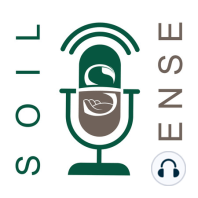31 min listen
Field Check: Hybrid Rye
FromSoil Sense
ratings:
Length:
10 minutes
Released:
Jul 27, 2020
Format:
Podcast episode
Description
“Hybrid small grain varieties seem to be gaining traction in some parts of Canada and the United States. What are the benefits and drawbacks of hybrid rye, wheat and barley varieties?” - Luke Struckman, Researcher and University Instructor based in Ottawa, Ontario, Canada.
Steve Zwinger is a Field Agronomist at the North Dakota State University Carrington Extension Center where he works with many cereal crops including hybrid varieties of rye.
“Some of these hybrids have been in in order to go over 200 or up to 200 bushels per acre range…..so the yield potential is there.” - Steve Zwinger
Steve continues with the hybrid rye advantages by explaining a shorter pollination window resulting in less ergot and a more uniform growth resulting in less lodge. With all of these advantages he does report a higher priced seed which depending on your market may not be worth the expense. At this time, Steve doesn’t know of too many farmers growing hybrid rye although seed production has begun.
There have been many attempts at producing a hybrid wheat. According to Steve “there are probably still people working on it, but there’s nothing commercially available.” Ultimately what was produced was not commercially viable enough to encourage ongoing research and development.
Follow the link www.NDFieldCheck.com to participate in our next question and answer segment to share your questions and get them answered by the experts!
Connect with Soil Sense at Soil Sense Initiative
Soil Sense Podcast is hosted by Tim Hammerich of the Future of Agriculture Podcast.
Steve Zwinger is a Field Agronomist at the North Dakota State University Carrington Extension Center where he works with many cereal crops including hybrid varieties of rye.
“Some of these hybrids have been in in order to go over 200 or up to 200 bushels per acre range…..so the yield potential is there.” - Steve Zwinger
Steve continues with the hybrid rye advantages by explaining a shorter pollination window resulting in less ergot and a more uniform growth resulting in less lodge. With all of these advantages he does report a higher priced seed which depending on your market may not be worth the expense. At this time, Steve doesn’t know of too many farmers growing hybrid rye although seed production has begun.
There have been many attempts at producing a hybrid wheat. According to Steve “there are probably still people working on it, but there’s nothing commercially available.” Ultimately what was produced was not commercially viable enough to encourage ongoing research and development.
Follow the link www.NDFieldCheck.com to participate in our next question and answer segment to share your questions and get them answered by the experts!
Connect with Soil Sense at Soil Sense Initiative
Soil Sense Podcast is hosted by Tim Hammerich of the Future of Agriculture Podcast.
Released:
Jul 27, 2020
Format:
Podcast episode
Titles in the series (100)
Taking Off with Soil Health with Matt Nelson by Soil Sense
